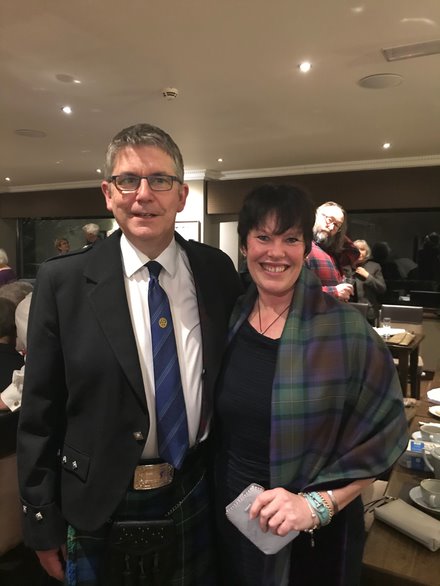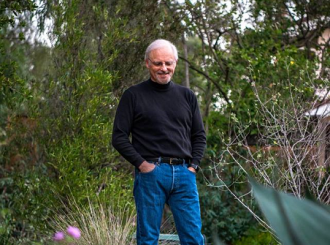Toast to the Lassies
by TheCat · Published · Updated
By Graham Smith
When I was asked by John to make the Toast to the Lassies, I was happy to oblige. Being a son to a mother, brother to a sister, husband to a wife, father to a daughter and a step-daughter – surely I knew a thing or two about the fairer sex? If you add to that CV the fact that I have spent the majority of my working life in the company of women, then this would elevate me to the status of expert in the subject, right?
Well of course I was completely deluded! If all of Burns’ work were published in a single volume and added to that of Shakespeare and Milton, then it would probably only cover the introduction of the masterwork that is ‘Woman’!
My reading informs me that the Burns night tradition began in 1801, five years after the Bard’s death. When the Toast to the Lassies became a permanent fixture, however, is uncertain, but we can be sure that whenever it was, gender roles were greatly different to today. As such, the toast to the lassies is a balancing act. A playful throwback to a bygone era, and a modern reinterpretation of the differences between the sexes.
If it isn’t good natured, fun, and affectionate (without being patronising), you’re missing the point. Remember, the tradition is old fashioned. Your job is to provide a fresh take on it.
I’m not entirely sure how I will go about this in our new post-Weinstein world, but I’ll give it my best shot.
Here we go then!
I would like to start by quoting from that esteemed publication Housekeeping Monthly – from its May 1955 issue.
Sensible advice to womenfolk preparing for their husband’s return from work;
Take 15 minutes to rest so you’ll be refreshed when he arrives. Touch up your make-up, put a ribbon in your hair and be fresh-looking.
Be a little gay and a little more interesting for him. His boring day may need a lift and one of your duties is to provide it.
At the time of his arrival, eliminate all noise of the washer, dryer or vacuum. Try to encourage the children to be quiet.
Listen to him. You may have a dozen important things to tell him, but the moment of his arrival is not the time. Let him talk first, remember, his topics of conversation are more important than yours.
Make the evening his. Never complain if he comes home late or goes out to dinner, or other places of entertainment, without you. Instead, try to understand his world of strain and pressure.
Arrange his cushion and offer to take off his shoes. Speak in a low, soothing and pleasant voice.
Don’t ask him questions about his actions. Remember, he is the master of the house and as such will always exercise his will with fairness and truthfulness. You have no right to question him.
It’s humiliating for us men that women can read us better than we can read women. You know we’re immature, gross, frivolous and slaves to our lower passions. This makes us uncomfortable. But what’s really chilling is that we have no real idea of what would make you happy. What should we get you for your birthday? (At this point, like the late Ronnie Corbett I will digress for a moment. I have to say that the current Mrs Smith is rather good at sending links via e-mail to well known online shopping sites named after South American Rivers – come to think of it, maybe the site in question is named after legendary female warriors!) What could we possibly say at the right moment that would make you suddenly laugh and look at us with gratitude and recognition? A woman’s steel-trap mind is terrifying to a guy because his simply doesn’t work the same way. A woman can recite incriminating details from any argument in the history of the relationship – like the time on the 18th of June 1999, in M&S on Sauchiehall Steet when he may have suggested that indeed her bum did look big in those jeans!
THINGY n.
Female: Any part under a car’s bonnet.
Male: The strap fastener on a woman’s bra.
VULNERABLE adj.
Female: Fully opening up one’s self emotionally to another.
Male: Playing rugby without a box.
COMMUNICATION n.
Female: The open sharing of thoughts and feelings with one’s partner.
Male: Scratching out a note before suddenly taking off for a weekend with the boys.
BUTT (but) n.
Female: The body part that every item of clothing manufactured makes “look bigger.”
Male: What you slap when someone’s scored a goal. Also good for mooning.
COMMITMENT n.
Female: A desire to get married and raise a family.
Male: Not trying to pick up other women while out with one’s girlfriend.
ENTERTAINMENT n.
Female: A good movie, concert, play or book.
Male: Anything that can be done while drinking.
FLATULENCE n.
Female: An embarrassing by-product of digestion.
Male: An endless source of entertainment, self-expression and male bonding.
REMOTE CONTROL n.
Female: A device for changing from one TV channel to another.
Male: A device for scanning through all 75 channels every three minutes.
Robert Burns was a philanderer, fornicator and father of bastard bairns, yes. But he was also a feminist. Robert Burns loved women. In fact, without women, he would not have written a single word. He said,
“I never had the least thought nor inclination of turning poet until I got heartily in love, then rhyme and song became the spontaneous language of my heart.”
Burns also thought of women as the superior of species. He said,
“Mither nature…her prentice hand she tried on man and then she made the lasses, O’”
That is how important the lasses were to Robert Burns. He loved the company of the fairer sex and, in fact, preferred it to that of men. He said,
“The finest hours that e’er I spent were spent amang the lasses, O’.”
Quite apart from his lovers, two key women who informed his view on women, fuelled the young Robert’s imagination and fired up his passion for words and stories were his mother, Agnes Burns and one of her old friends – Betty Davidson. Agnes Burns was a small, vibrant woman with wild red hair who could not write but could read beautifully. She read traditional Scottish stories to Burns and sang old folk songs which she had picked up from the strong oral tradition that prevailed around that time.
Betty Davidson delighted in telling the boy ghost stories involving the devil, warlocks and fairies. Robert Burns wrote Tam O’Shanter in one short evening, but it is clear that that poem had been bubbling away inside him since he was that small, terrified young boy listening to Betty’s tall tales of superstition, apparition and dragons by the dim light of the crackling fire. Robert Burns also advocated for women’s rights . The poem, The Rights of Women, may seem patronising to us today but in 1792 it was groundbreaking, shocking and even laughable – particularly amongst the men Burns fraternized with in his supper clubs and Masonic halls. Burns wrote this poem for Ms Louisa Fontenelle, a London actress who performed it at a benefit night:
While Europe’s eye is fix’d on mighty things, The fate of Empires and the fall of Kings; While quacks of State must each produce his plan, And even children lisp the Rights of Man; Amid this mighty fuss just let me mention, The Rights of Woman merit some attention.
Robert Burns is calling to the social order, particularly the ruling classes, to pay attention to the attributes of women in society – and womankind in general – and to value their intrinsic worth, particularly as pacifiers in a time of war (it was the time of The French Revolution – a cause, it is widely thought, Burns supported). Robert Burns was a ‘ladies’ man’ in every sense of the word. Women made him, women inspired him and women educated him. Yes, Burns was a reckless romantic who fell in love – and into bed – too easily with women. But this does not mean that he disrespected them or treated them badly or thought them inferior to himself. Women also loved Robert Burns – and it is well-known that Celtic women extended freely what was euphemistically called ‘The Friendship of the Thighs’. The lasses – along with Robert Burns – worked long hard hours in the fields and barley. They were very close to nature. Burns valued and appreciated women for their beauty and intellect, along with their political views, their humour and their passions for words and language. And he stuck up for them and advocated for them at a time when women had no rights at all. Robert Burns held women socially and intellectually his equals and did not understand why the men around him did not. In this poem he is asking – nee, pleading – with the ruling classes to appreciate and respect women and to give them the rights of decorum, protection and admiration. These ‘rights’ may seem condescending to us today but they were enlightened for – if limited by – the time.
Gentlemen, we love the lassies, and it’s as simple as that. When all is said and done, I think I personally have to return to the simpler sentiment Burns conveyed in “Green Grow the Rashes, O”
The sweetest hours that e’er I spend,
Are spent amang the lasses, O.
With that in mind: Gentlemen!
Please seize ye’r drinks, an’ raise ye’r glasses,
I propose a toast: Here’s tae the lassies!













